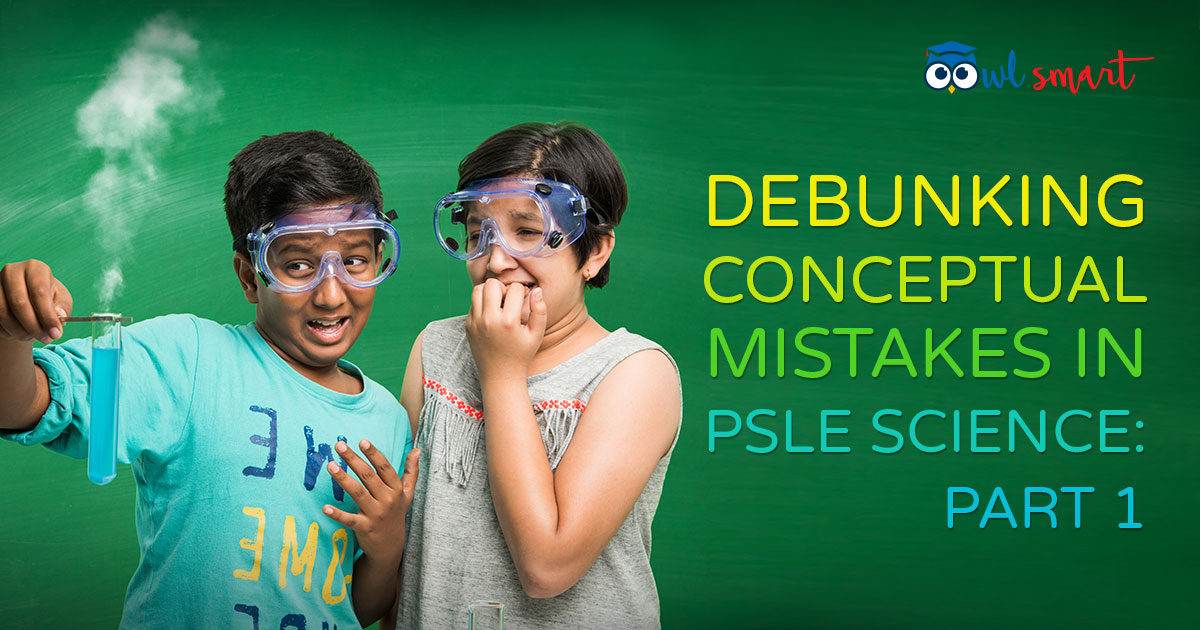
You have probably heard from many people, including your child’s Science teacher, that Science is all about keywords and key concepts. On top of that, a pupil also needs to master some answering techniques and have consistent practices in order to excel in PSLE Science.
Having correct understanding of scientific key concepts is the first step to do well for PSLE Science. In this article, we will debunk some of the most common misconceptions in Science.

Misconception 1
All plants reproduce from seeds.
Many pupils think that all plants reproduce from seeds as they usually see seeds in the fruits they eat.
The truth is…
Some plants can reproduce from plant parts like bryophyllum, banana, pineapples, etc. Some plants like moss and ferns reproduce from spores.
Misconception 2
Plants produce flowers for humans’ benefits and so that bees have honey to consume.
This misconception is often one of the distractors in MCQ questions. Since butterflies and bees are often seen flying around flowers, a lot of pupils will assume that plants produce flowers for humans’ benefits and so that bees have honey to consume.
The truth is…
Plants produce flowers primarily for reproduction so that their own kind can continue to exist. Plants do not produce flowers for the benefits of other organisms.
Misconception 3
Grass do not have flowers.
Grasses are small and do not catch attention. A lot of people, including adults, do not observe them closely and think that they do not have flowers.
The Truth is…
Grasses are flowering plants but their flowers are usually small and not attractive for people to notice. The flowers are usually wind-pollinated.
Misconception 4
Dispersal of seeds is important so that seedlings can avoid competition for water, space, nutrients, sunlight, air and food.
A lot of pupils think that dispersal of seeds is important so that seedlings can avoid competition for water, space, nutrients, sunlight, air and food.
Marks are deducted for including air and food. This is a very common mistake made in school-based exam papers and PSLE Science paper.
The truth is…
Dispersal of seeds is important so that seedlings can avoid competition for water, space, nutrients and sunlight. There is plenty of air and plants make their own food. They do not compete for air and food.
Misconception 5
Foetus grows in the stomach.
You can often hear children saying that a pregnant woman has a big tummy because there is a baby inside the stomach.
The truth is…
Foetus grows in the womb. Stomach is part of the digestive system while womb is part of the reproductive system.
Misconception 6
All eggs will grow into young organisms.
Many pupils think that all eggs will grow into young organisms…and some of them wonder why the eggs that their mothers bought from supermarkets had not hatched yet.
The truth is…
Only fertilised eggs can grow into young organisms.
Misconception 7
Transportation tubes in plants carry oxygen and carbon dioxide.
Many pupils are confused between the materials transported in human circulatory system and plant transport system. They think that transportation tubes in plants also carry oxygen and carbon dioxide like in humans.
The truth is…
Transportation tubes in plants do not carry gases. They transport water, minerals and food only.
Misconception 8
Water-carrying tubes are found only in stems.
Water-carrying tubes are found only in stems. A lot of pupils have this misunderstanding… perhaps the pictures used in those questions on transportation tubes in plants normally show water-carrying tubes in the stems only.
The truth is…
Water-carrying tubes are found in other parts of the plants like roots, flowers, stem and leaves.
Misconception 9
An animal grows bigger because its cells grow bigger.
An animal grows bigger because its cells grow bigger. This is a frequently used distractor in MCQ question that causes some pupils to lose unnecessary marks.
The truth is…
An animal grows bigger because its cells undergo cell division so that there are more cells.
Misconception 10
All things on earth have cells.
Some pupils do not realise that a cell is the most basic unit of life and think that all things (including non-living things) on earth have cells.
The truth is…
Only living things have cell(s).
Clearing Your Misconceptions
The OwlSmart PSLE Science database provides concise explanations for the key concept(s) tested in each question. Sign up to get a free trial and look out for the next Science article in which I will share with you more common misconceptions that upper primary pupils usually have. Keep on learning! You can do it!
About the Author
Teacher Zen has over a decade of experience in teaching upper primary Math and Science in local schools. He has a post-graduate diploma in education from NIE and has a wealth of experience in marking PSLE Science and Math papers. When not teaching or working on OwlSmart, he enjoys watching soccer and supports Liverpool football team.



